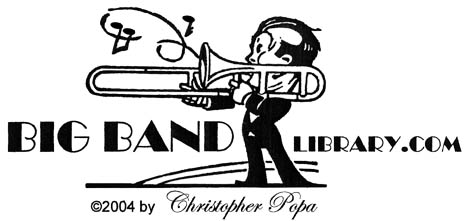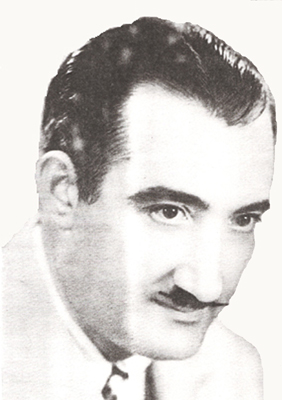
When Hall's band was not at the Taft, they were likely somewhere across town, perhaps at the Paramount, Capitol, or Strand theatre, or nearby at, say, Loew's State Theatre in Newark, NJ.
They also toured the Midwest and South, appearing at other well-known hotels such as the Claridge in Memphis, the Baker in Dallas, and the Roosevelt in New Orleans.
The tagline of Hall's band, used on its regular radio broadcasts, was "Dance with Romance."
vital stats:
given name (George Edward Hall?)
birth ca.1893? (or Dec. 24, 1899, IL?)
death Mar. 3, 1989, New York City? (or Oct. 9, 1978, Portage, MI, "myocardial infarct" as a
consequence of "arterosclerotic heart disease"?)
father (Edward Hall?)
wife
son (Roger A. Hall?)
Actually, between 1926 and 1940, Hall made hundreds of records. Besides Pathe Actuelle and Bluebird, they also recorded, at various times, for Banner, Cameo, Variety, Vocalion, and Okeh.
They appeared in two film shorts, "George Hall and His Orchestra," directed in 1936 by Roy Mack for the Vitaphone Corporation, and "Hall's Holiday," directed in 1938 by Leslie M. Roush for Paramount's "Headliner" series.
Sidemen in Hall's band included, at different periods, Joe Ferrante, trumpet; George Paxton, tenor saxophone; Tony Mottola, guitar; Doc Goldberg, bass; Johnny Guarnieri, piano; and Nick Fatool, drums.
But the group's biggest attraction proved to be its ebullient vocalist, Dolly Dawn, who was only a teenager when she joined them, on May 20, 1935. (She had been born Theresa Maria Stabile, and was considering several stage names when she met Harriet Mencken, a columnist for the New York Journal-American newspaper. Mencken suggested, "Well, you're as dimpled as a dolly, and as fresh as the dawn . . . What about Dolly Dawn?")
Dawn she chose, and as she later explained to writer Warren Vache, Sr., "Since I was a minor I was not allowed to perform in New York City without a legal guardian, and since my parents lived in New Jersey, somebody else had to become my legal guardian. So, Mr. and Mrs. George Hall stepped in to fulfill the requirement, and I started to study with a private tutor so I wouldn't miss going to school."
In fact, Hall came to believe that his band had more potential with Dawn fronting it. Therefore, on July 4, 1941, at the Roseland Ballroom in New York City, he officially turned the group over to her, and stayed on as their manager.
The band called themselves "Dolly Dawn and Her Dawn Patrol Boys," evidently inspired by Ed Sullivan's newspaper column, "Along the Dawn Patrol," which was carried in the
[ New York ] Daily News.
But by the end of 1941, with the urging of the Music Corporation of America (MCA), Dawn went out on her own, as a single attraction.
Hall, who had seemingly grown tired of leading a band, got his wish.
In fact, critic George T. Simon of Metronome magazine once commented that Hall was "an affable man who looked more like the chief buyer in a men's clothing store than a bandleader," and later remarked that Hall's band was one of several that were "about as musical as a submerged submarine."
Who could blame Hall if he never reorganized another orchestra?
Dawn, who had wanted to be an entertainer ever since she was a young girl, got her wish, too. She continued to perform until shortly before her death from kidney failure in 2002.
As for their fans, a two-record Bluebird reissue, "George Hall and His Hotel Taft Orchestra" (AXM2-5504), was produced in 1975 by historian Frank Driggs, who also wrote the album's liner notes. It contained 32 selections, including Weather Man, which had been Dawn's first vocal with Hall's band, and, appropriately, a song titled There Goes My Dream.
sources:
"Certificate of Death: George Edward Hall," State of Michigan Department of Public Health,
Oct. 1978.
"George Hall and His Orchestra On Local Stage Tuesday," St. Petersburg [ FL ] Times,
Jan. 14, 1940.
The Internet Movie Database, imdb.com.
Roger D. Kinkle, "Hall, George," in The Complete Encyclopedia of Popular Music and Jazz
1900-1950: Volume 2 Biographies A Through K (New Rochelle, NY: Arlington House
Publishers, 1974), pp.1032-1033.
---, "Hall, George," in Leading Musical Performers (Popular Music and Jazz) 1900 - 1950
(Mt. Vernon, IN: Windmill Publications, Inc., 1996), p.138.
Douglas Martin, "Dolly Dawn, 86, Who Sang Center Stage in the Big Band Era," New York
Times, Dec. 18, 2002, p.33.
Dennis McLellan, "Obituaries: Dolly Dawn, 86; Popular Big-Band Singer in '30s, '40s,"
Los Angeles Times, Dec. 20, 2002, p.B13.
Brian Rust, "George Hall," in The American Dance Band Discography 1917-1942:
Volume 1 Irving Aaronson to Arthur Lange (New Rochhele, NY: Arlington House
Publishers, 1975), pp.701-714.
George T. Simon, "George Hall," in The Big Bands (New York City: Macmillan Publishing
Company, Inc., 1967), pp.228-229.
---, Simon Says: The Sights and Sounds of the Swing Era 1935-1955 (New Rochelle, NY:
Arlington House, 1971), p.12.
Warren Vache, Sr., "Reminiscing With Dolly Dawn," Mississippi Rag, June 1993, pp.22-26.
Leo Walker, "George Hall," in The Big Band Almanac (Pasadena, CA: Ward Ritchie Press,
1978), p.164.
I would like to expand this tribute with, if possible, a new interview of someone who was important to George Hall's life or career. Are you an alumnus of his band, a member of his family, or a collector who is knowledgeable about his accomplishments? Please contact me via e-mail
return to "Biographical Sketches" directory
go to Big Band Library homepage
The big bands are back
in a new and exciting way!
GEORGE HALL
"TWO DREAMS GOT TOGETHER"
by Music Librarian CHRISTOPHER POPA
April 2009
A story in a 1940 newspaper said that he would have preferred to have been a doctor, rather than a musician. But bandleading it was, at least for a while.
Hall's band got its first taste of success in the 1920s, at the Arcadia Ballroom in New York City.
As "George Hall and His Arcadians," they made their first records in 1926 for the Pathe Actuelle label.
But their biggest fame came in 1933, when they were signed to perform in the Grill Room of the Hotel Taft in New York City. They eventually played there for eight consecutive seasons.
With the billing changed to "George Hall and His Hotel Taft Orchestra," they began recording for Bluebird that year, making some 170 sides for them during the next four years.

George Hall